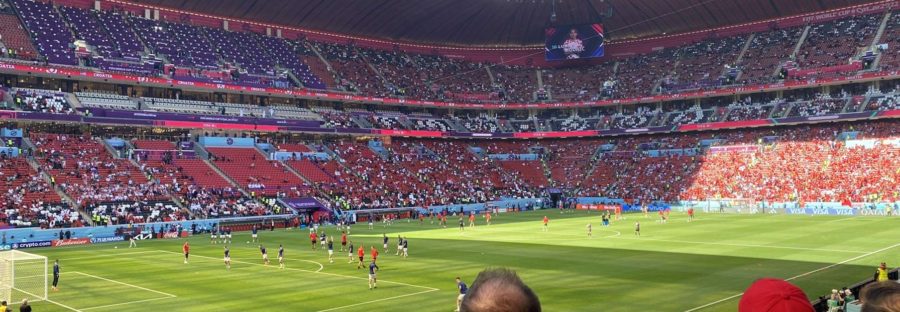MMU sports journalism’s World Cup coverage Week 1: Shocks on and off the pitch
Jude McGuirk
The Qatar world cup has been the centre of media attention during the build-up to the tournament and whilst it has been on. From no beer sales to lack of Human Rights, it is all happening in the richest country in the world in the middle east.
In the process of making the stadium to host the matches, it has been revealed that over 6,500 migrant workers have died due to the lack in quality of working conditions provided to them. It has also been reported by The Guardian that security guards are paid 35p per hour. This has been the main talking point from the BBC and ITV World Cup panel when covering the games, almost overshadowing the games themselves.
This affects the tournament as many famous figures are making a stand against Qatar, such as Alex Scott, Dua Lipa and Rod Stewart. However, some have had backlash as David Beckham has agreed to be a Qatar ambassador for $150 million. Joe Lycett especially has come out against him in protest. This furthers the bad reputation Qatar and their most expensive World Cup of all time have in the media.
LGBTQ+ Controversy – Joe Ward
Although the football in Qatar has got underway, the conversations surrounding the treatment of the LGBTQ+ community in the host nation have yet to take a backseat.
On the morning of England’s opener, the Three Lions announced they would no longer be wearing the One Love rainbow armbands against Iran after FIFA warned that players will be booked for doing so.
It’s fair to say the discission to do so hasn’t gone un-noticed. Manchester’s gay and inclusive football team, Village Manchester FC, reacted to the announcement with a message that read: “An armband that’s barely visible from the side of the pitch, let alone on TV, was already an embarrassingly small gesture towards inclusion.
“Our expectations of FIFA have long been rock bottom. Today they continue to prove that they are not fit to govern the game.”
Other members of the LGBTQ+ football community have reacted in outrage to the abandonment, such as the Gay Football Network that took to social media to voice their opinion.
🤡🤡🤡 #FIFAWorldCup pic.twitter.com/6hmlkhYEnU
— Village Manchester FC (@villagemancfc) November 21, 2022
Shattering colonial myths – Chloe Mogridge
Qatar is the smallest country ever to host the world’s largest sporting event. Doha is one of the fastest developing cities in the world, showcasing well equipped modern technology and an accessible vase range of transport.
Despite the medias backlash towards Qatar hosting the World Cup, it is forgotten that previous countries have also had the same stigmas towards the culture. Switzerland hosted in 1954 with extreme weather conditions, United States filled with race riots throughout 1994. As well, in recent years Russia’s rising homophobia issues that were uncovered during 2018 World Cup. If all these issues have been clearly pinpointed throughout previous hosts, why does Qatar get the negative spotlight by the media?
As a result of the drinking ban throughout the stadium, it shows that Qatar is willing to sacrifice the drinking violence that is generally seen throughout football games. The country is attempting to reduce foul language and racism whilst wanting to focus the attention on the sport.
Biggest story on the pitch – Patrick Watson
Argentina were given a massive surprise as Saudi Arabia came from behind to earn a historic win over the South American champions.
This is considered one of the biggest upsets in World Cup history. 48 places separate these teams in FIFA rankings as The Green Falcons are ranked 51st in the world; Argentina are up in third place.
As one would expect, the media was shocked. Notably, a fan tweeted this in response:
Today wasn’t just a victory for Saudi Arabia but for the whole of the Middle East who have been subjected to discrimination by the western media. pic.twitter.com/f7WWOiqMBh
— Trey (@MCFCTrey_2) November 22, 2022
The user believes that with Qatar’s human rights record controversies, the media have had an agenda against the Middle East.
Fans of other Middle Eastern countries (even those who would normally dislike Saudi Arabia) are happy with the outcome and it was described as ‘historical. Not only for Saudi Arabia but all Arabs.
According to Middle East Eye, Yemen’s Houthis strongly congratulated Saudi Arabia, saying “this victory put Arab football back on the map”. This shows what it means to the Middle East, especially given political tensions between Yemen and Saudi Arabia.
Salem Al-Dawsari’s winning goal sparked wild celebrations amongst Saudi fans, including these scenes which were simply just in someone’s living room:
Geezer ripped off the door 🤣🤣🤣🤣 pic.twitter.com/PqycW9871f
— Footy Limbs (@FootyLimbs) November 22, 2022


